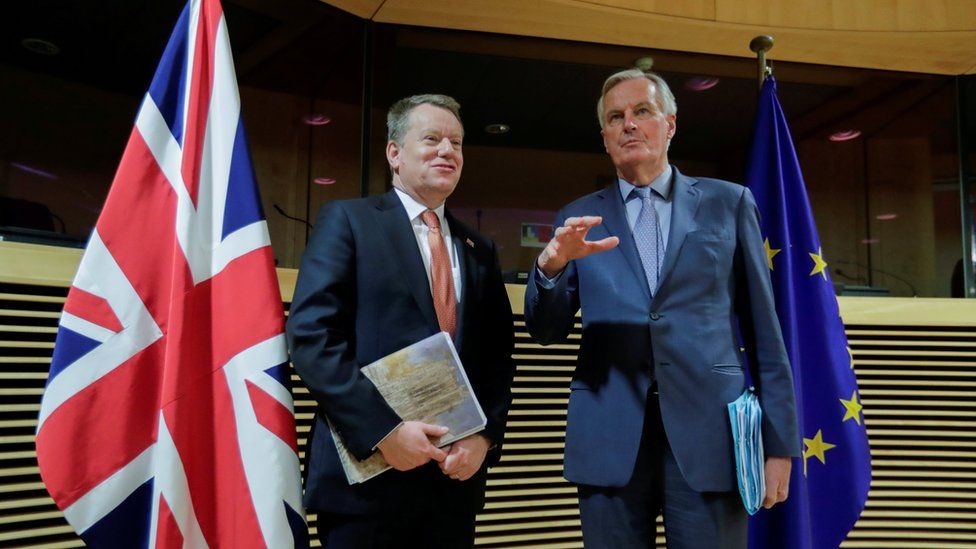Brexit: UK chief negotiator calls for 'realism' from EU
- Published
- comments

The UK's chief Brexit negotiator has called for "realism" from the EU ahead of the next round of trade talks beginning in London.
Lord Frost said there was "still time" for the two sides to agree a post-Brexit trade deal for next year.
But he said the EU needed to recognise the UK's negotiating position came from that of a "sovereign state".
His words follow a pledge from Boris Johnson to walk away from the talks if a deal isn't done by 15 October.
The EU said it would "do everything in [its] power to reach an agreement" with the UK, but "will be ready" for a no-deal scenario.
The exchange also comes after No 10 revealed it would be introducing new legislation on customs rules in Northern Ireland, in case the negotiations fail.
The announcement has led to concerns from Brussels that the UK would not deliver on the withdrawal agreement, made ahead of its exit from the bloc in January.
But the government said the legislation would only result in "minor clarifications" and it was committed to the earlier deal.
The transition period - which sees the UK following a number of the EU's rules while the two sides try to negotiate a trade deal - is due to end on 31 December.
If a deal is not made and ratified by parliaments across Europe by then, the UK will move onto trading with the bloc on World Trade Organisation rules, which would involve tariffs. Critics fear this would damage the economy.
Mr Johnson has ruled out any extension to the talks and, despite both sides admitting to little progress recently, he has set a deadline of mid-October - when the European Council is due to meet.
In an email to Conservative Party members on Monday, the prime minister said if there was no agreement by that date, "then I do not see that there will be a free trade agreement between us, and we should both accept that and move on".
BBC Reality Check’s Chris Morris looks at where the UK and EU are struggling to agree on their future relationship
'Well-trodden ground'
Lord Frost, who has led the UK's team of negotiators in talks since March, will meet his opposite number from the EU, Michel Barnier, on Tuesday at the start of the eighth round of talks between the two sides.
He was introduced as a peer for the first time in the House of Lords earlier, having been ennobled by Mr Johnson in July.
Speaking ahead of his meeting with Mr Barnier, Lord Frost promised to "drive home our clear message that we must make progress this week if we are to reach an agreement in time".
Lord Frost added: "We have now been talking for six months and can no longer afford to go over well-trodden ground. We need to see more realism from the EU about our status as an independent country.
"As we have done from the beginning in public and in private, I will reinforce our simple, reasonable request for a free trade agreement based on those the EU has signed before with like-minded partners."
Lord Frost said the UK had "listened closely" to the bloc's team and "signalled flexibility" on where it can move, but added: "We have repeatedly made clear that key elements of our position derive from the fundamentals of being a sovereign state, and it's time for the EU to fully recognise this reality."
He said the UK was "ramping up" preparations for a no-deal outcome, but also said he hoped progress could be made this week.
Beyond all the talk, there is a genuine frustration in government that the EU is yet to treat the UK as if it were a fully sovereign country.
That's matched on the EU side by similar irritation that the UK won't budge.
But the bad tempers do not necessarily mean that a deal won't be reached.
And all the blood curdling vows don't mean that in the end there won't be compromise.
European Commission spokesman Dan Ferie said the EU had "engaged constructively and in good faith" with the talks so far and would be "fully concentrated on making the most out of this week's negotiating round".
But, while he said the bloc shared the UK's "desire to reach a deal quickly", it should be "in line with the EU's long-term economic and political interests".
Mr Ferie added: "The EU has made numerous constructive proposals to move the negotiations forward.
"And Michel Barnier has repeatedly said that there needs to be enough time later this year for the European Parliament and the Council to have their say on any agreement.
"Whether or not there is an agreement in place by the end of the year, the UK's decision to leave the single market and the customs union will inevitably create barriers to trade across border exchanges that do not exist today."